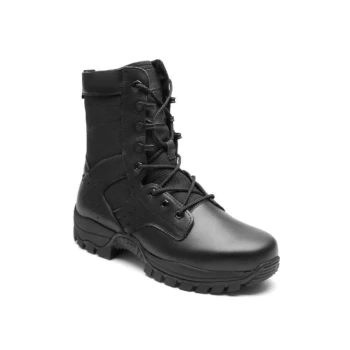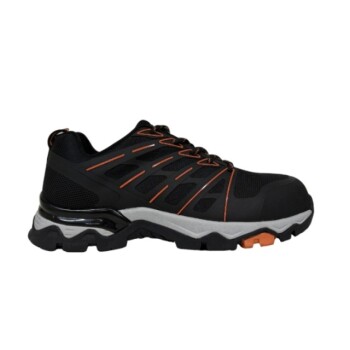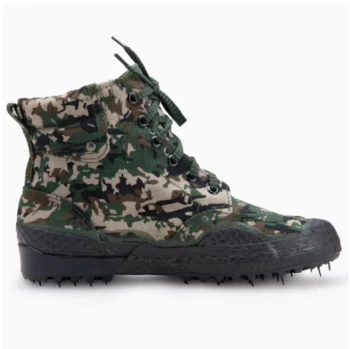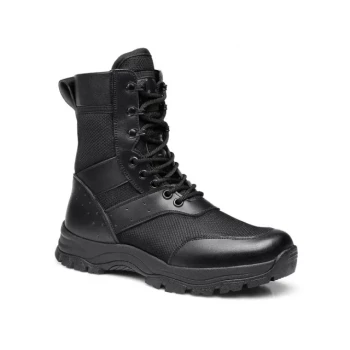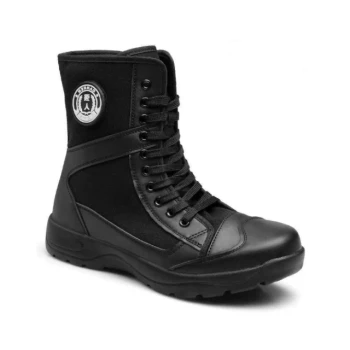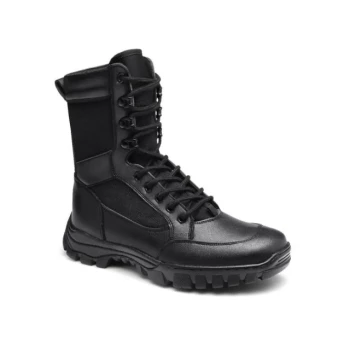The primary consideration when choosing between snake boots and rubber boots for hunting in South Carolina is a direct trade-off between guaranteed snakebite protection and guaranteed waterproofing. Snake boots are specifically designed to stop fangs, while rubber boots are designed to keep you completely dry in swamps and marshes. Your choice depends on which environmental threat—venomous snakes or water—is more immediate in your specific hunting location.
In the diverse environments of South Carolina, from wet coastal lowlands to dry inland forests, your choice of boot is an exercise in risk assessment. You must align your footwear with the specific terrain and predominant threat of your hunting grounds, as no single boot is perfect for every situation.
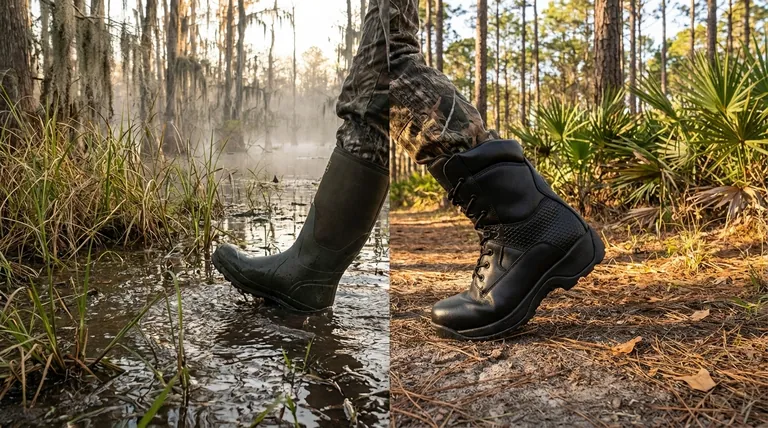
The Case for Snake Boots: Prioritizing Protection
Snake boots are purpose-built for a single, critical task: preventing the fangs of a venomous snake from penetrating to your skin.
How Snake Boots Provide Protection
These boots use tough, layered materials like thick leather, Cordura nylon, or other synthetic weaves. This construction is designed to deflect or stop a snake's fangs, which are surprisingly fragile and cannot easily puncture such robust surfaces.
The Advantage of Confidence
South Carolina is home to several venomous snake species, including copperheads, rattlesnakes, and cottonmouths (water moccasins). Wearing snake boots provides crucial peace of mind, allowing you to move through underbrush, tall grass, or field edges with significantly reduced risk.
Are They Truly Waterproof?
Many modern snake boots are labeled "waterproof," often using a membrane liner. However, their seams, zippers, and material composition create more potential failure points than a solid rubber boot. They are better described as highly water-resistant and will perform well in rain or damp fields, but may not withstand prolonged submersion.
The Case for Rubber Boots: Conquering Wet Terrain
For many of South Carolina's premier hunting areas, especially in the Lowcountry, water is not a possibility—it's a certainty.
Unmatched Waterproofing
Rubber boots, often called Muck or Swamp boots, feature a seamless, molded construction. This monolithic design makes them 100% waterproof up to the top of the boot, which is essential for wading through creeks, flooded timber, and swamps.
Scent Control Benefits
A secondary but significant advantage of rubber is that it is non-porous. This means it traps human scent far more effectively than the leather and fabrics found in most snake boots, a key consideration for deer hunters.
The Obvious Protection Gap
Standard rubber boots offer minimal protection against a direct strike from a venomous snake. While the thick rubber may offer some slight resistance, it is not designed or rated to stop fangs and should not be relied upon for that purpose.
Understanding the Trade-offs
Choosing the right boot means being honest about the limitations of each design.
Protection vs. Waterproofing
This is the central dilemma. Snake boots offer superior protection from a specific threat but are only water-resistant. Rubber boots offer complete waterproofing but almost no reliable snake protection.
Breathability and All-Day Comfort
Rubber boots do not breathe. On warm South Carolina days, they can become extremely hot and sweaty, leading to discomfort. Snake boots, particularly those with fabric panels, offer significantly better breathability, making them more comfortable for long walks in upland areas.
Terrain and Durability
Snake boots are typically built on a more traditional hiking boot platform. This provides better ankle support and a more aggressive outsole for navigating varied terrain like hills and dry, uneven ground. Rubber boots excel in mud and muck but can feel clumsy and less stable on dry land.
Making the Right Choice for Your South Carolina Hunt
Your decision should be based entirely on the environment you will spend the most time in.
- If your primary focus is upland hunting for turkey, quail, or deer in pine forests and fields: Snake boots are the superior choice, as the risk of snakes often outweighs the need for total waterproofing.
- If your primary focus is waterfowl hunting or tracking deer through swamps, marshes, and creek bottoms: Knee-high rubber boots are non-negotiable to stay dry and effective.
- If your hunt involves frequent transitions between wet and dry ground: Consider a high-quality, waterproof-rated snake boot as a compromise, but understand you are sacrificing some waterproofing for guaranteed protection.
Ultimately, the best boot allows you to focus on the hunt with confidence, knowing you’ve correctly matched your gear to the ground beneath your feet.
Summary Table:
| Feature | Snake Boots | Rubber Boots |
|---|---|---|
| Primary Protection | Venomous snake bites | Water, mud, and moisture |
| Waterproofing | Water-resistant (good for rain/damp) | 100% Waterproof (ideal for swamps) |
| Best For Terrain | Upland areas, fields, dry forests | Swamps, marshes, creek bottoms |
| Key Advantage | Peace of mind from snake strikes | Keeps feet completely dry; superior scent control |
| Main Disadvantage | Not fully waterproof for prolonged submersion | No reliable protection against snake bites |
Ready to Gear Up for Your Next Hunt?
As a large-scale manufacturer, 3515 produces a comprehensive range of durable footwear for distributors, brand owners, and bulk clients. Whether your customers need the critical protection of snake-proof boots or the absolute waterproofing of rugged rubber boots, our production capabilities encompass all types of hunting footwear.
We can help you equip hunters with the right gear for South Carolina's diverse terrain. Contact our team today to discuss your specific needs and explore our product lines.
Visual Guide
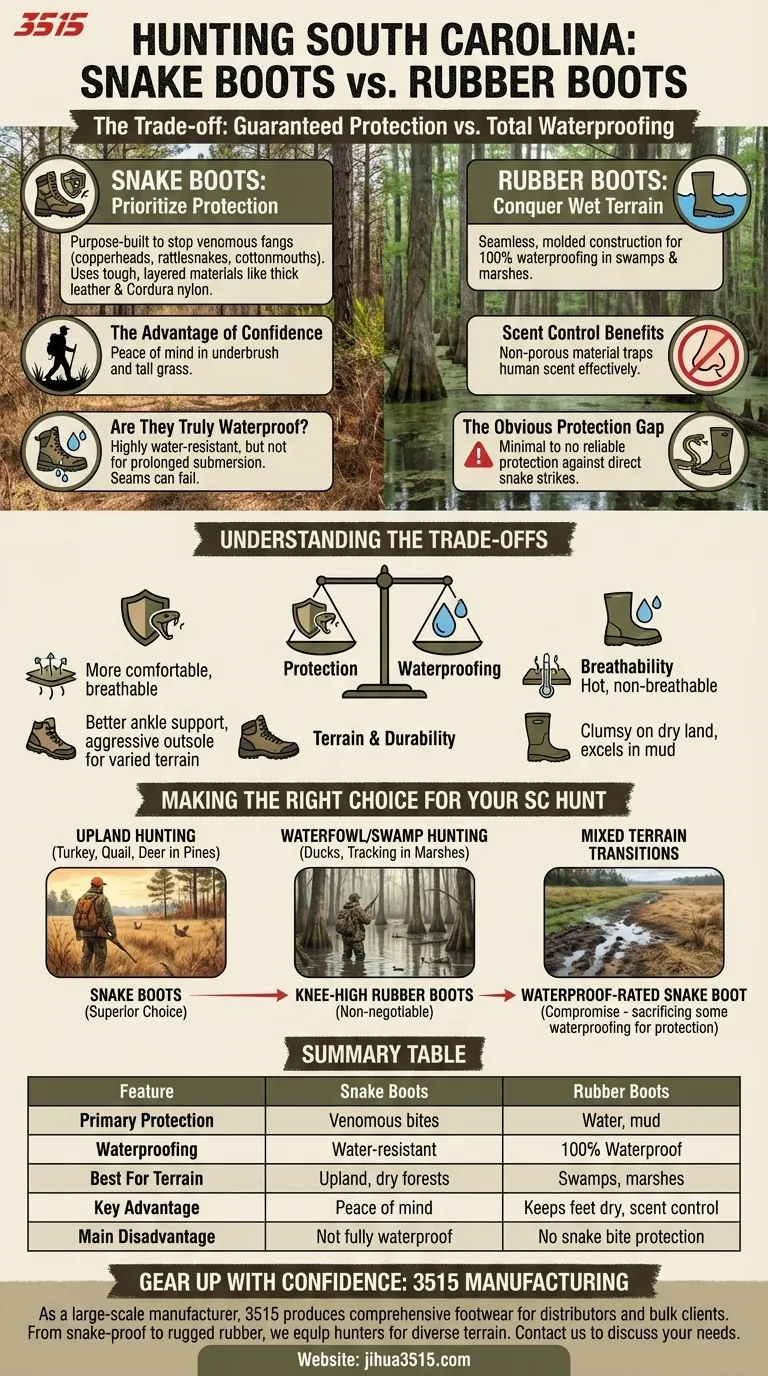
Related Products
- Premium Grain Leather Safety Boots for Bulk Supply
- Premium Wholesale Waterproof Safety Boots High Performance Protection for Industrial Markets
- Customizable Anti-Smash Safety Boots for Wholesale & Private Label Manufacturing
- Custom Wholesale Leather Safety Boots Direct Factory Manufacturing
- Premium Wholesale Wheat Nubuck Safety Boot with Rapid Lacing System
People Also Ask
- Is there a downside to steel toe boots? Weighing Protection Against Daily Comfort
- Is safety-toe as good as steel toe? Choose the Right Protection for Your Job
- Do moc toe boots have steel toe? Get Durable, Safety-Compliant Footwear
- Is safety toe better than steel toe? A Guide to Choosing the Right Protection
- What does OSHA say about steel toe boots? A Guide to Compliant Footwear








